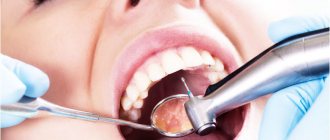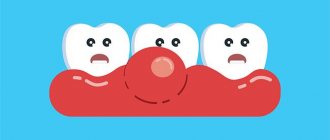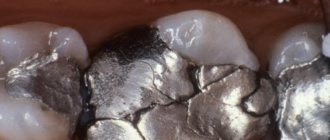Author's rating
Author of the article
Green Elena Stanislavovna
Otolaryngologist of the second category
Articles written
665
about the author
From time to time, each of us can feel the taste of iron in our mouths. Usually people do not pay attention to this for the reason that the aftertaste goes away within a few minutes. But what if he doesn’t leave you for a long time - days or even weeks? Here we can talk about various pathologies. What does a cough with a metallic taste mean, why does belching occur with a metallic taste - more on that later.
The mechanism of the appearance of taste sensations
It is not always easy for even doctors to determine the cause of the taste in the mouth.
Special receptors, mostly located on the papillae of the tongue, are responsible for the sensation of taste in humans. A few receptors are located on the palate and back of the pharynx. All of them are sensitive to several dozen different tastes and their combinations.
Taste sensitivity, like an ear for music, is individual for each person; it can be developed and improved, achieving the ideal taste, like tasters or sommeliers. Despite individual differences, the sensation of the five basic tastes: salty, sweet, sour, bitter, and the taste of meat products is accessible to absolutely everyone.
When a product hits the taste buds, the sensations they receive travel through nerve fibers to the brain. A full sensation and perception of taste is impossible without its combination with smell.
When abnormal sensations such as a metallic taste appear, occurring suddenly, without any apparent connection or cause, it is necessary to find out the etiology of this symptom in order to correct your condition, especially if such sensations occur regularly.
What symptoms require immediate medical attention?
You should postpone visiting a doctor, or better yet, call an ambulance if you have the following symptoms:
- Sputum interspersed with blood.
- Attacks of suffocation.
- Presence of injury.
This does not mean that if you have other symptoms you should not see a doctor.
The visit can only be postponed for a few hours or days, but in no case should it be canceled completely.
External factors causing a metallic taste in the mouth
These reasons may be associated both with the influence of external factors and with physiological changes in the body. For example, metal can be felt when drinking certain brands of mineral water enriched with iron ions. Iron can reach your taste buds through untreated tap water passing through worn and rusty pipes. The solution in this situation is to use a high-quality cleaning filter.
The use of aluminum pots and cast iron cauldrons and frying pans may cause a metallic taste to be added to the traditional taste of food, especially if sour foods were cooked in it. In this case, the metal of the kitchen utensil reacts with food acids, salts are formed, and this is what is felt by the one who tastes this food.
Metal crowns can also cause a metallic taste, especially if they were installed a long time ago. Acidic foods can react with the metal ions in your dentures, creating a faint but very unpleasant taste.
Diagnostic methods
Making the correct diagnosis is the key to correct treatment. Remember that only a doctor should prescribe it to you and diagnose the disease. When visiting a medical institution with a similar complaint, you will be sent for the following studies:
- Blood analysis. This analysis will evaluate blood hemoglobin, the number of red blood cells, white blood cells, and platelets.
- Blood chemistry. This test helps detect increases in certain chemical components of the blood, including Iron, iron transport proteins and other compounds.
- X-ray for suspected diseases of the respiratory system.
- Computed or magnetic resonance imaging.
- Endoscopy of the esophagus and stomach if diseases are suspected in them.
- Bacteriological culture. If your doctor suspects a bacterial infection, he or she may order a culture to identify the pathogen.
In each specific clinical case, the combination of diagnostic methods is unique, although it corresponds to the general research schemes.
Physiological conditions as a cause of metallic taste
Piercing as a cause of metallic taste in the mouth
If you do not pay enough attention to oral hygiene, you can soon experience this unpleasant symptom. Tartar, bleeding gums, periodontitis, plaque on the teeth and tongue - all these problems affect the appearance of distorted taste sensations.
The use of high-quality toothpaste and mouth rinse, the use of dental floss, and timely sanitation of teeth and gums can eliminate this problem. Hormonal changes in a woman’s life are certainly reflected in changes in the chemical composition of certain environments in her body.
In particular, menopause, pregnancy, and lactation change some positions of the blood formula. This is why sometimes a metallic taste appears in the mouth of women, especially often during pregnancy. Working in hazardous industries, accidents involving exposure to chemical compounds, and unfavorable environmental conditions can cause poisoning, one of the symptoms of which is the taste of metal in the mouth. Mercury, zinc, lead, copper, and arsenic are especially dangerous in this regard.
If poisoning with these chemicals occurs, then the metallic taste is accompanied by symptoms such as:
- Intense thirst.
- Continuous headache.
- Confusion.
- Nausea and vomiting.
- Dizziness.
- Pain in the abdomen and muscles throughout the body.
Without seeking medical help, a person with similar symptoms of poisoning may die or become disabled. A condition that is not as dangerous, but still very unpleasant and also accompanied by a metallic taste in the mouth, can be anemia, or iron deficiency. You can find out about its presence by donating blood for hemoglobin. Anemia can manifest itself with the following symptoms:
- Loss of strength, drowsiness.
- Headaches and dizziness.
- Dry skin, hair, brittle nails.
- Pale skin.
- Cardiopalmus.
- Cracks, or “jams” in the corners of the lips.
- Dry mouth, taste disturbances.
Although there is not enough iron in the body in this condition, it is its taste that becomes a frequent companion to anemia. It can be caused by an unbalanced diet, an increased need for iron compounds during pregnancy and lactation, and rapid growth of children and adolescents.
In addition to iron deficiency, the same reasons can lead to hypovitaminosis - a lack of individual vitamins or their groups. And just as with anemia, the taste of metal in the mouth can be a companion to this condition. Hypovitaminosis may cause irritability, drowsiness or insomnia, and decreased physical and intellectual potential. Taking vitamin complexes and enriching your diet with healthy foods will solve this problem.
Treatment
Help before diagnosis
To reduce the metallic taste, it is recommended to carefully monitor hygiene: brush your teeth at least 2 times a day, use a toothpick or dental floss after each meal, and rinse your mouth with water. To overcome the disturbing taste, you can add spices with a strong aroma to food - cinnamon, cardamom, pepper. If there are metal utensils in the house, it is advisable to replace them with glass or ceramic ones.
If you have a strong metallic taste, doctors advise eating a mint candy or a slice of orange and rinsing your mouth with water and lemon juice. You should not use medications uncontrollably, as they often leave a “iron” aftertaste. If taste disturbances are combined with nausea and vomiting, abdominal pain and general malaise, you should seek medical help as soon as possible.
Conservative therapy
The drug treatment regimen is selected depending on the cause of the metallic taste in the mouth. In most cases, etiotropic drugs are prescribed that eliminate the underlying disease, and local rinses are used for local lesions of the oral cavity. The most effective medications are:
- Iron supplements
. Medicines eliminate microelement deficiency in the body and successfully eliminate the manifestations of anemia. The course of treatment is at least 1 month, then iron is taken in low doses for another 2-3 months. For other types of anemia, vitamin B12 and folic acid supplements are recommended. - Antisecretory agents
. They reduce the production of hydrochloric acid in the stomach and normalize digestive function, due to which the metallic taste disappears. The most effective drugs are from the group of proton pump inhibitors; H2-histamine blockers are also used. - Corticosteroids
. Medicines are used to treat renal pathology as a common cause of uncomfortable taste sensations in the mouth. They have a pronounced anti-inflammatory effect, reduce damage to the renal tubules by circulating immune complexes and autoantibodies. - Antibiotics
. The drugs are prescribed for massive bacterial processes in the oral cavity, exacerbation of sinusitis and purulent bronchitis. Antibiotics are taken in tablet form for 7-10 days; for severe pyelonephritis, intravenous administration and a combination of 2 drugs are indicated. - Complexons
. They are chelate compounds that, when ingested, bind and neutralize heavy metals. They must be administered as soon as possible after poisoning. The drugs are combined with massive detoxification therapy with saline and colloid solutions.
Metallic taste is a symptom of disease
A metallic taste in the mouth is a reason to see a doctor.
Diseases of the gastrointestinal tract, in addition to specific symptoms at the location of the pathology, are often accompanied by the appearance of various tastes in the mouth, and a metallic taste is no exception. Most often it accompanies the following diseases:
Alarming symptoms
If you have a metallic taste in your mouth after coughing, you should not panic ahead of time. Only in the aggregate of a number of symptoms can one really become concerned and go to the doctor for further investigation.
You can go to the doctor at any time convenient for you in the following cases:
- You do not experience significant discomfort due to the taste and smell of iron appearing in your mouth. This symptom does not bother you.
- In the event that the oral cavity is visited by the smell of iron only from time to time, also without causing you significant inconvenience.
- If, apart from the unpleasant taste and smell, you do not feel any other symptoms.
Additional manifestations of the disease, such as headaches, weakness, apathy, loss of strength, drowsiness, inadequate skin color, digestive problems, and signs of intoxication, may be a reason for suspicion.
Maybe,
Side effects of medications that affect the appearance of foreign taste
A metallic taste in the mouth may occur while taking medications.
When using a number of medications, a metallic taste may accompany their use, being a side effect of the medications. These are the following groups of drugs:
- Medicines to lower cholesterol levels.
- Medicines used to treat gout.
- Antidiabetic drugs.
- Medicines for the treatment of asthma.
- Antidiabetic drugs.
- Antibiotics.
- Corticosteroids.
- Antihistamines.
- Antifungal drugs.
- Antihistamines.
- Medicines to regulate blood pressure.
In most cases, this taste will cease to be felt with the end of drug therapy, however, this side effect of the drug should be reported to the attending physician.
How to get rid of the problem
If the cause of this is not a symptom of a disease, or a change in physiological state, you can try to eliminate the problem by rinsing with a salt solution (a teaspoon per half liter of water), drinking fruit and vegetable juices. You can chew propolis, ginger root, fresh mint leaves, and add dried spices to drinks.
Brushing your teeth after every meal, using rinses, dental floss for additional cleaning of interdental spaces, brushing your tongue with a special brush - all these measures will help get rid of the unpleasant taste in your mouth. Timely installation and replacement of dentures and dental sanitation can solve the problem.
Treatment methods
It is quite difficult to talk about treatment, since the iron taste in the mouth is only a symptom that is often accompanied by some diseases of both the respiratory, digestive and circulatory systems.
It is necessary to treat not the symptom itself, but the disease that was the cause. The treatment method for each of the above cases is different.
For example, with anemia, the main task is to eliminate the cause of its development and replenish the supply of hemoglobin, iron, and red blood cells in a person’s blood.
In case of poisoning with metal salts, urgently begin detoxification therapy.










